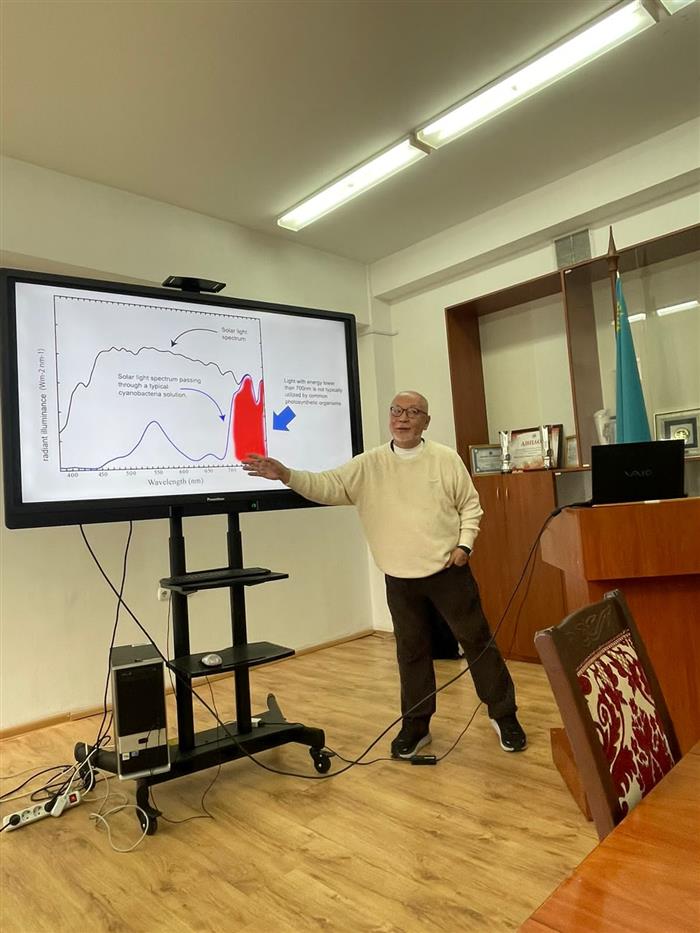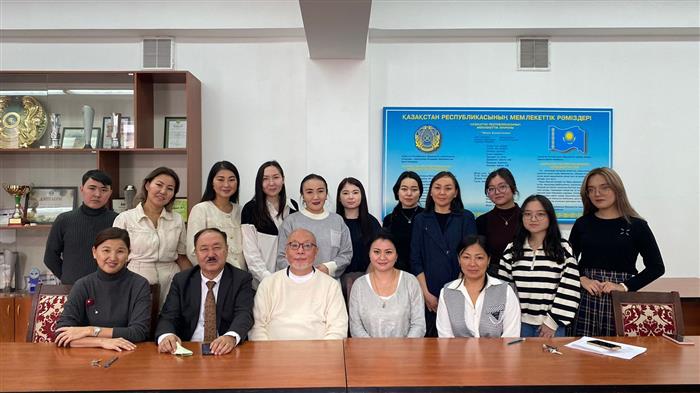THE FUTURE PROSPECTS OF INTERNATIONAL COOPERATION BETWEEN THE FACULTY OF NATURAL SCIENCES OF THE TOKYO UNIVERSITY OF SCIENCE AND THE FACULTY OF BIOLOGY AND BIOTECHNOLOGY OF AL-FARABI KAZAKH NATIONAL UNIVERSITY WERE DISCUSSED
Views: 390

To achieve the Sustainable Development Goal 17, aimed at fostering international partnerships, the faculty actively engages in international cooperation. One such meeting took place on October 23-25, 2023, during a working visit by Professor Tatsuya Tomo from the Faculty of Science division at the Tokyo University of Science to Al-Farabi Kazakh National University. Professor Tatsuya Tomo heads the photosynthesis laboratory within the Faculty of Natural Sciences at Tokyo University of Science. He is a member of the NanoPhotoBioSciences Association, the Japanese Society for Photosynthesis Research, and the Biophysical Society of Japan. Professor Tomo is an internationally recognized scientist and a key organizer of annual international meetings focused on photosynthesis research and sustainable development in Japan. His contributions to the study of photosynthesis and its potential applications are invaluable.
During this visit to our university, Professor Tatsuya Tomo met with the Dean of the Faculty of Biology and Biotechnology, Professor M.S. Kurmanbayeva. The discussions focused on prospects for collaboration and knowledge exchange in the field of biotechnology. Professor M.S. Kurmanbayeva emphasized that international partnership with the Tokyo University of Science holds significant interest for the faculty. The opportunities for collaborative scientific research and mentoring of doctoral candidates offer new horizons for our institution. The importance of our doctoral candidates' contributions to joint research efforts was particularly highlighted during the meeting.

This visit specifically emphasizes collaboration and joint research in the sphere of biofuels and bioenergy. Research conducted by doctoral candidates and young researchers from the Faculty of Biology and Biotechnology, such as PhD candidates B.D. Kosalbayev and A.B. Kakimova, in the field of bioenergy and laboratory methods for producing biohydrogen, holds critical importance for both parties. The implementation of biohydrogen as an alternative energy source holds significant importance in the search for environmentally friendly energy sources. Biohydrogen represents a potentially safe, sustainable, and efficient means of energy generation, as its production involves the use of biological processes. This contributes to reducing greenhouse gas emissions and minimizing the negative impact on the environment, making our energy sector more sustainable and environmentally friendly. The use of biohydrogen also offers prospects for the development of new energy technologies and innovations, helping reduce reliance on fossil resources and leading to the creation of a more sustainable energy infrastructure.

This fosters deeper collaboration and opens opportunities for research in the realms of photosynthesis, biofuels, and bioenergy. Research in the fields of functional biochemistry and biophysics, including the study of photosynthesis and photosystem I, alongside issues of bioenergy and biofuels, holds critical importance in understanding the mechanisms underlying vital processes. These studies not only help expand our knowledge of living organisms but also pave the way for the development of more efficient and ecologically sustainable energy production methods. They play a key role in creating new promising solutions that can impact the development of ecologically sustainable technologies and address humanity's energy needs based on biological principles.
During his visit, Professor Tomo Tatsuya gave an interesting lecture on the topic “Primary reaction of oxygenic photosynthesis and chlorophylls" and shared his experience in the field of biochemistry and biophysics of photosynthesis.
The Faculty of Biology and Biotechnology is committed to strengthening its interaction with the Tokyo University of Science. We believe that this visit holds tremendous potential to serve as a starting point for the development of long-term partnerships, contributing to the growth of our global scientific community.









